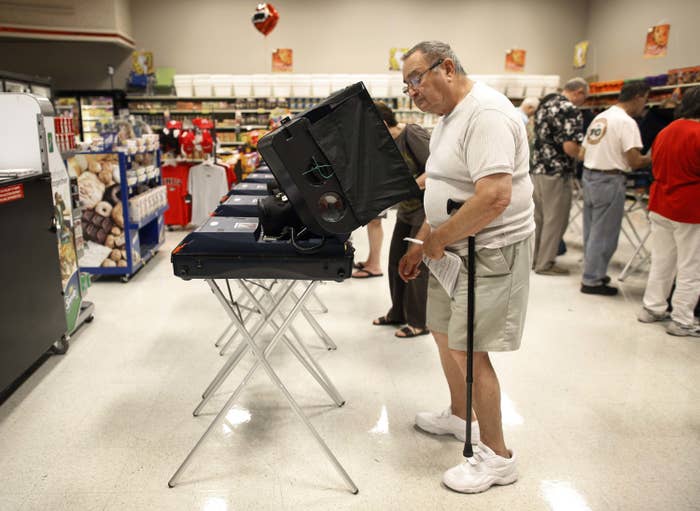
US citizens living in China and South Korea have been told they won’t be able to cast their vote in person for the Democratic primary next month and will instead need to vote online, according to Democrats Abroad, the group in charge of overseeing voting overseas.
And as the coronavirus outbreak has spread to 38 countries, triggering concerns about a global pandemic, CDC officials warned on Tuesday that they expect the virus to spread to the US — and told US businesses and schools to prepare.
The news raises questions about whether the coronavirus outbreak could interrupt the lead-up to the biggest national event of the year: the 2020 election.
So far, only three states — Iowa, New Hampshire, and Nevada — have weighed in on who should be the Democratic presidential nominee. But a flood of Americans will soon follow, first with voting in South Carolina on Saturday, then a massive blitz of voting and caucusing next week on Super Tuesday involving 14 states and Americans living abroad. All primary voting ends by June 7.
When asked about what discussions or preparations were underway to address potential interruptions to primary voting or caucuses, the Democratic National Committee said that decisions about state elections were made by state parties, and decisions about primary voting were made by state officials. When asked about whether it had any contingency plans for this year’s Democratic National Convention in Milwaukee in July, which is run by the DNC and typically features thousands of delegates and party members, it declined to comment. (The Republican National Committee did not respond to similar questions about planning for its August convention in Charlotte.)
The closing of the two voting centers in China, one in Shanghai and another in Beijing, was announced on February 18 in response to local ordinances restricting travel and public events, as well as a State Department recommendation to US citizens in the country to stay indoors, according to Maya Hixson, a Democratic National Committee spokesperson. Democrats Abroad announced on February 26 in-person voting was cancelled in South Korea, too.
"Our number one concern is to ensure all eligible voters are able to make their voices heard without jeopardizing anyone's health and safety,” Hixson told BuzzFeed News. “Democrats Abroad has robust systems in place so that members can still exercise their right to vote, and we are working with them as the situation develops."
As of Tuesday, the coronavirus outbreak had spread to more than 80,000 cases and 2,700 deaths worldwide, with the vast majority occurring in China. South Korea, the biggest pocket of cases outside of China, has reported 977 cases, but in contrast to the Chinese response in Hubei province, it has chosen not to put the epicenter of the outbreak on lockdown. In Italy, which at 270 cases has the biggest outbreak outside of Asia, public events like the Venice Carnival have been canceled.
In the US, there have been a total of 14 reported cases of COVID-19, the illness caused by the new coronavirus, as well as 43 cases of US citizens with the illness brought back to the US from China’s Hubei province and the Diamond Princess cruise ship. Although the disease is currently contained in the US, the CDC warned on Tuesday that “community spread” is likely inevitable.
In-person primary voting is still planned for early March in Italy, but things could change at the last minute, according to Democrats Abroad.
“People can absolutely vote from home! With this recent outbreak, we are encouraging people to do this more than ever,” Angela Sittaro, a Democrats Abroad Italy organizer, told BuzzFeed News in a Facebook message.
Public gatherings, such as voting, caucusing, and rallies, provide opportunities to spread diseases because large numbers of people are packed closely together, possibly touching the same surfaces. It’s unknown exactly how many hours the coronavirus can survive on surfaces or how exactly it's spread, although there’s some indication people can spread the virus even if they aren’t displaying severe symptoms.
There are ways of handling the risk, according to Irwin Redlener, director of Columbia University’s National Center for Disaster Preparedness. You can separate people more, such as extending voting over several days to thin out the crowds, regularly wiping down voting surfaces, or using disposal covers. “I don’t see us having to cancel the normal political process, but we may have to make changes,” Redlener told BuzzFeed News.
President Donald Trump tweeted on Monday that “The Coronavirus is very much under control in the USA,” and later that day the White House sent Congress a $2.5 billion request for emergency funds to help respond to the threat. Some Democratic presidential candidates, including Sen. Elizabeth Warren and former vice president Joe Biden, have since criticized the Trump administration’s handling of the outbreak.
BuzzFeed News asked all the leading Democratic campaigns about their candidates’ plans in the event of a nationwide coronavirus spread. The Warren and Biden campaigns declined to comment; the Pete Buttigieg, Amy Klobuchar, and Bernie Sanders campaigns did not respond.
Galia Slayen, a campaign spokesperson for former New York mayor Michael Bloomberg, said, "Mike is developing a plan for how to best tackle this emerging pandemic and consulted with former CDC officials in developing that strategy.” Slayden did not elaborate on the strategy.
UPDATE
This story has been updated to reflect that in-person voting has been cancelled in South Korea.

